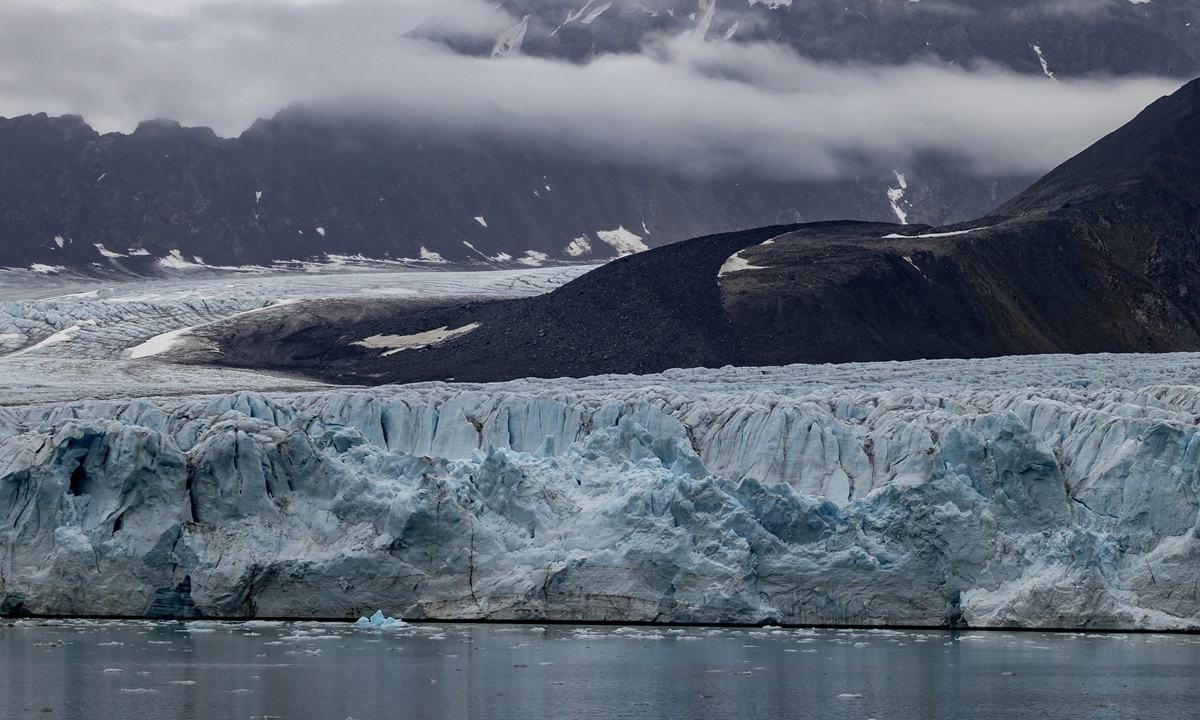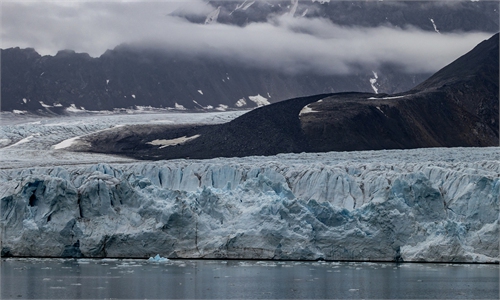Potential for China-Russia cooperation in the Russian Arctic highlighted at forum
Projects benefit both amid global uncertainty: experts

A view of fiords as they melt due to climate change near Svalbard Islands, in the Arctic Ocean in Norway on July 19, 2022.Photo:VCG
As the continued development of the Arctic Zone of the Russian Federation (AZRF) and Northern Sea Route (NSR) despite Western sanctions was highlighted at the Eastern Economic Forum (EEF) in Vladivostok on Tuesday, Chinese experts called for more cooperation between China and Russia in the Arctic.
Cooperation involving the arctic economic passage suits the interests of both sides and can be a win-win situation for both, as it will help China shorten transportation times and secure energy supplies, while also helping Russia gain capital, techniques and infrastructure support for its Arctic projects, Chinese experts noted.
A conference on investment and trade in the Arctic at the EEF on Tuesday revealed that despite turbulence of the global economy and the heightened sanctions pressure this year, several major investment projects continue to be implemented in the Russia Arctic zone, according to the EEF's website.
The Arctic route will further drive global transport costs down by offering an alternative route for maritime shipping companies, breaking the monopoly of some of the world's key waterways, Wang Jianjiao, research fellow with Silk Road Academy of Social Sciences, told the Global Times on Tuesday.
Seaborne trade accounts for 60 percent of total bilateral trade between China and the EU, and the Arctic route could cut shipping times between China and the EU by one-third compared with the Suez Canal, reducing costs, fuel consumption and pollution, Wang said.
Such cooperation will also help China bolster energy security.
China-Russia cooperation on energy projects and infrastructure in the Arctic can be key sectors and be beneficial for both economies, Li Xin, director of the Institute for Eurasian Studies at the Shanghai University of Political Science and Law, told the Global Times.
Chinese energy companies may have chances to join the co-development, and the success of the Yamal liquefied natural gas (LNG) project has offered a good example of energy cooperation between the two countries in the Arctic, Li said.
Located in Russia's Yamal Peninsula in the Arctic, the project began shipments to China in July 2018, and it has sent 3 million tons of Yamal LNG to China every year from 2019, the Xinhua News Agency reported.
The project also helps Russia increase investment, employment and tax revenues, as nearly $10 billion worth of contracts have been signed with 650 Russian enterprises, according to Xinhua.
"Building infrastructure along the Arctic route will be a giant project, including the construction of highways, railways and deep harbors for large ships, which will need help from Chinese enterprises," Li added.
Russia is incentivizing businesses and individuals to settle in the Arctic to enhance economic growth in the region.
In a recent move, Russian Prime Minister Mikhail Mishustin approved the plan for development of the Northern Sea Route through 2035, with over 150 events included, and financing totaling almost 1.8 trillion rubles ($30 billion). Cargo traffic along the NSA is expected to reach 220 million tons by 2035, TASS reported.
As China and Russia deepen cooperation in the Arctic, there will be broad prospects for investment and cooperation for Chinese companies, Chen Jia, an independent research fellow on international strategy, told the Global Times on Tuesday.
"Among the Russian projects in the Arctic, most of them are related to fossil and renewable energy. As China has established a global advantage in new energy, it will be easier for Chinese companies to tap into the market," Chen said.
That said, challenges also exist, experts warned.
Wang said that in the short term, the operation cost of the route will still be high due to limited available routes, the high cost of extracting raw materials from the Arctic, high ship insurance premiums and difficulties in the operation of container ships.
"It is expected that the disadvantage of high economic costs in the early stage will be reduced with investment and infrastructure improvement. Therefore, relevant enterprises should accelerate the layout of this new blue sea of opportunities in the Arctic region," Wang said.



